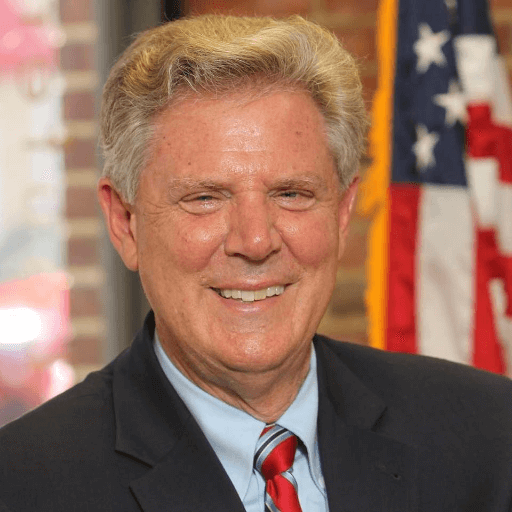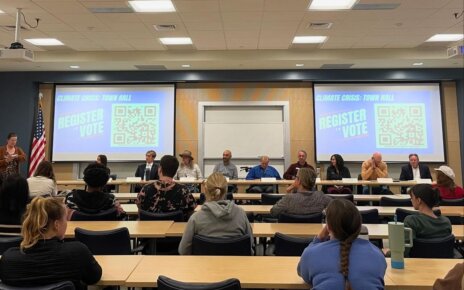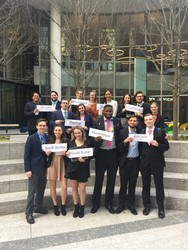Congressman Frank Pallone joined the Monmouth University community to discuss Congressional action on climate change as a last-minute addition to the Climate Crisis Teach-In week on Thursday, Oct. 7.
Pallone began the session by providing a brief overview of how the United States is preparing for the upcoming Glasgow Conference, which is set to take place in mid-November. “We are hoping that when we go, we can say that the United States is doing X, Y and Z to try to meet the goals of the Paris Agreement,” said Pallone.
Earlier this year, Pallone’s Energy and Congress Committee put forth a bill called the Clean Future Act which outlines the actions that Democrats would like to see taken by Congress to address the climate crisis.
“The main vehicle right now are two bills that you’ve probably heard a lot about in the past few months because we’ve been trying to pass them. One passed the Senate, which they call the
Senate Infrastructure Bill, and the other one is put together in the House of Representatives which is called the Build Back Better Act, or is also called the Reconciliation Act,” explained Pallone.
“The Senate bill was bipartisan, so there wasn’t a lot that addressed climate action because a lot of the Republicans don’t want to admit that there’s a climate crisis,” continued Pallone. “It did have some things with regard to resiliency and energy efficiency, but it didn’t have much to move away from fossil fuels and towards renewable energy. There was very little in that regard because most of the time, Republicans won’t support that.”
The other bill, the Build Back Better Act, incorporates many aspects of the Clean Future Act that seek to move away from fossil fuels and toward renewable energy resources. It does so primarily through a credit program that awards credits and imposes penalties on utilities who do not meet clean energy goals.
“This reconciliation process is a budget process that doesn’t allow us to do authorization bills, which is why we moved away from the Clean Future Act’s authorization and mandates into just using tax credits or subsidies as an incentive,” Pallone explained. “The Clean Future Act is a much more comprehensive bill, but when you do the Build Back Better Act as a reconciliation bill in order to avoid the filibuster, you can only use things like tax incentives and subsidies. You can’t mandate. Everything in the bill has to be like a budget initiative, not an authorization.”
The bill’s main purpose is to encourage utilities to move away from fossil fuels, which has been met with some reluctance from conservative Democrats in the Senate.
Pallone went on to describe issues that Congress has encountered in passing these bills. With the Senate split 50/50 and Democrats having a mere margin of three in the House of Representatives, coming together to pass these bills has been difficult.
“I do believe that both of these bills will pass, maybe with some changes, but I don’t think as many changes on climate as on healthcare and some of the other issues that I deal with. We hope to have this wrapped up by the end of the month so that when we go to Glasgow, we can say that we’ve accomplished a lot.”
“The nice thing about Glasgow is that we’re back in. When I went to the Madrid Conference, Trump was President and he didn’t participate,” said Pallone, who went on to describe his initial fear that other nations would be angry with the United States because of Trump’s efforts to withdraw. Unexpectedly, many people were glad to see U.S. representatives at the event because it showed that the nation still cared despite opposing views from the President.
When asked about the Living Shorelines Act, Pallone explained why it cannot be a part of the current bills Congress is looking to pass. “This reconciliation process is a budget process that doesn’t allow us to do authorization bills. All you can do is spend money or raise taxes,” explained Pallone. “We’re trying to move it, but it can’t be part of this process because it is authorizing a new program. We’re hoping that it’ll come to a vote in the next year because we have a lot of bipartisan support.”
This bipartisan support encompasses only a small range of proposed climate solutions. “Republicans like Army Corps projects and beach replenishment projects because they don’t have to admit that sea level rise is because of increases in greenhouse gases. I’ll get them to agree to a beach replenishment project because they don’t have to say that they’re responding to the environment or climate change in order to do so,” explained Pallone.
“The same is true for efficiency, where if you’re a Republican you can be in favor of increased efficiency without saying that it has anything to do with climate action. There’s a lot of that in the Senate and in our bill, but again it doesn’t go to the heart of Paris and Glasgow in my opinion.”
“I try to not be too partisan, but it’s hard in this case because a lot of these things are just being done with Democrats,” said Pallone. “When I talk about the right and the left, I’m talking within the Democrats. There’s some things that the Republicans support, but things have become so partisan on these bills in Washington right now that there’s not much help, if any, coming from the other side.”



